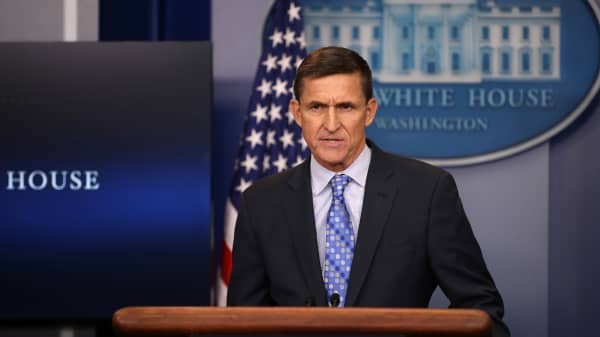With National Security Advisor Michael Flynn's departure, it's clear that Team Trump is ending its first month in a state of chaos and dysfunction. Rumors from multiple sources indicate that White House Chief of Staff Reince Preibus and Press Secretary Sean Spicer are also on thin ice, setting the stage for unheard of early turnover in some of the White House's most important positions.
Staff drama in the Trump administration should come as no surprise. According to several people who've worked directly with Donald Trump, the rivalries and competition evident early on in this administration are an essential part of his management approach.
While Trump may believe chaos and dysfunction are perfectly acceptable management tools, the reality is that Trump has done a few things that will ensure his approach to managing the White House will fail.
1. Trump rewards loyalty over competence
This wasn't the first time Michael Flynn left a high profile national security position in a cloud of controversy. His tenure as Director of the Defense Intelligence Agency (DIA) ended with allegations of a chaotic management style, an abusive relationship with subordinates, and a loose command of facts—known during his time at DIA as "Flynn Facts."
Surely a chaotic style, abusive behavior, and a loose command of facts would scare anyone away from choosing such a person for an important national security position. Not Trump.
Flynn was a flawed candidate for the role of National Security Advisor, but Trump rewarded him for his loyalty—until it became impossible to deny that Flynn had an irrefutably shady relationship with Russia.
2. Trump eliminates clear lines of authority
Want to create a dysfunctional workplace?
Make sure no one knows exactly who calls the shots.
In Trump's White House, is it his Chief of Staff, who came from the Republican establishment Trump spent months bashing? Is it his Chief Strategist, who openly calls Trump a "blunt instrument" in his quest for total world domination? Is it his Counselor, who is willing to make up whole massacres to advance his agenda? Or is it his son-in-law, who just might be the most powerful person in the White House?
No one really knows.
In the television sitcom The Office, salesman Jim Halpert (played by John Krasinski) is promoted to co-manager, where he will share authority with fellow co-manager Michael Scott (played by Steve Carrell). This power-sharing scenario causes another employee to sarcastically comment, "Where would the Catholic Church be without the two Popes?"
There aren't two people calling the shots because power-sharing scenarios are usually notable disasters. Without a clear leader, the Trump White House will continue to muddle through one mess after another.
3. Trump hires family
Everyone knows that if you want real chaos in an organization, hire family, give them vague titles and lavishly praise them to anyone who will listen.
Sure, Trump's son-in-law Jared Kushner may not be at the very top of the organizational chart, but in this White House everyone knows the answer to these questions:
Who holds real influence here, the people who jumped on the bandwagon to further their own agenda, or the guy who's raising the next generation of Trump Organization executive vice presidents?
Among White House staff, who will be there for Donald Trump when the band stops playing Hail to the Chief?
Jared Kushner.
Like Vin Diesel says in pretty much every Fast and Furious movie, family is everything.
Trump knows that. Other staff know it, too.
That's why hiring family is such an effective way to create truly epic dysfunction.
4. Trump encourages infighting
In a dysfunctional team, you don't quietly sit down and hash out disagreements with Human Resources over coffee and bagels.
Instead, you go to the media and, off the record, tell a reporter what a moron your colleague is. Or if you're the boss, like Donald Trump, you can have your friend and Newsmax CEO Christopher Ruddy tell The Washington Post your Chief of Staff is "in way over his head."
So why doesn't Donald Trump just hire qualified people, create clear lines of authority, and put a stop to people airing their dirty laundry on morning shows?
Because that would be boring. And if there is one thing the last election taught us, it's that in the age of reality TV, entertainment can beat competence in an election.
However—and it is sometimes unclear if Trump realizes this—the election is over.
Being president isn't the same thing as pitting Arsenio Hall and Clay Aiken against each other to see who should be the next Celebrity Apprentice.
Incompetence, competing centers of power, nepotism, and warring staff are always a toxic recipe—and for the Trump administration, the departure of the man who led "Lock her up" chants while passing information to Russia may be just the beginning of the disaster.
Commentary by Dustin McKissen, the founder and CEO of McKissen + Company, a strategy, marketing, and public relations firm based in St. Charles, Missouri. He was named one of LinkedIn's "Top Voices" in 2015 and 2016, and is currently pursuing a PhD in Organizational and Industrial Psychology. Follow him on Twitter @DMcKissen.
For more insight from CNBC contributors, follow @CNBCOpinion on Twitter.




